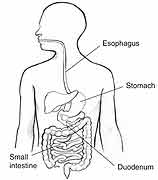
THURSDAY, June 16 (HealthDay News) — The risk of cancer associated with the condition known as Barrett’s esophagus may be lower than previously thought, according to a new long-term study.
People diagnosed with the premalignant condition are advised to undergo routine endoscopies to screen for esophageal adenocarcinoma, a common form of esophageal cancer. Endoscopy involves insertion of a long, thin tube with a camera at the end into the esophagus, enabling doctors to check for abnormalities.
In conducting the study, published online June 16 in the Journal of the National Cancer Institute, researchers in Northern Ireland followed more than 8,500 patients diagnosed with Barrett’s esophagus.
During a follow-up period averaging seven years, 79 of the patients were diagnosed with esophageal cancer. Cancer of the gastric cardia (the part of the stomach closest to the esophagus) was diagnosed in another 16 participants, and 36 developed precancerous changes known as high-grade dysplasia.
Overall, the combined incidence rate for these three conditions was 0.22 percent per year — much lower than the 0.58 percent and 3 percent annual rates of cancer reported in prior studies, the authors said in a journal news release.
The findings suggest the recommended routine cancer screenings among Barrett’s esophagus patients are based on inflated estimates of cancer risk and may not be necessary, they said.
One U.S. expert called the findings “important.”
“It emphasizes the need to not only identify those with who have Barrett’s esophagus but also to then identify those who will go on to possibly develop cancer, since most will not. We can then create a more selective approach to the 1 to 2 percent of Americans who have Barrett’s, said Dr. Sharmila Anandasabapathy, an associate professor of medicine and gastroenterology, and medical director of endoscopy at Mount Sinai Medical Center in New York City.
The study also found that people aged 60 to 69 were at greater risk for cancer than patients under 50 or older than 80, and that men were more likely than women to progress to cancer.
“The study underscores the fact that white men over 50 are the ‘bulls eye’ high risk group for the development of esophageal cancer and should be screened annually,” noted another expert, Dr Jonathan E. Aviv, clinical director of the Voice and Swallowing Center at ENT and Allergy Associates in New York City.
Dr. Douglas Corley, of Kaiser Permanente’s research division in Oakland, Calif., and author of an accompanying editorial, added in the news release that the study could “help inform the development of more meaningful personalized risk scores that incorporate demographic, biochemical, and genetic factors.”
More information
The U.S. National Digestive Diseases Information Clearinghouse provides more information on Barrett’s esophagus.

